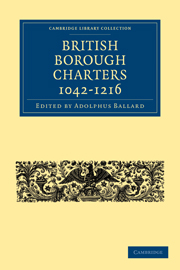Book contents
- Frontmatter
- PREFACE
- Contents
- LIST OF ABBREVIATIONS
- INTRODUCTION
- TABLE SHOWING CONTENTS OF CHARTERS
- CHARTERS
- I FORMATION OF BOROUGH
- II A BURGAGE TENURE AND LAW OF REAL PROPERTY
- II B TENURIAL PRIVILEGES
- III BURGESS FRANCHISE
- IV JURISDICTIONAL PRIVILEGES
- V MERCANTILE PRIVILEGES
- VI BOROUGH FINANCES
- VII BOROUGH OFFICERS
- APPENDIX
- INDEX
IV - JURISDICTIONAL PRIVILEGES
Published online by Cambridge University Press: 12 April 2011
- Frontmatter
- PREFACE
- Contents
- LIST OF ABBREVIATIONS
- INTRODUCTION
- TABLE SHOWING CONTENTS OF CHARTERS
- CHARTERS
- I FORMATION OF BOROUGH
- II A BURGAGE TENURE AND LAW OF REAL PROPERTY
- II B TENURIAL PRIVILEGES
- III BURGESS FRANCHISE
- IV JURISDICTIONAL PRIVILEGES
- V MERCANTILE PRIVILEGES
- VI BOROUGH FINANCES
- VII BOROUGH OFFICERS
- APPENDIX
- INDEX
Summary
Liberty to Compound Offences
NORHAM 1153—95. Si quis burgensium percusserit extra cemeterium sine sanguine et ictu apparente emendationes inter se faciant sicut liberi burgenses solent; ita quod de fractura pacis nihil requiratur pro securitate.
(If any of the burgesses strike another outside the graveyard without bloodshed and visible bruise, they may make amends to one another as free burgesses are wont, so that nothing be required for security for breaking the peace.)
WELLS, 1174—80. Volumus preterea si lis aliqua dampnosa intra ambitum messagii alicui eorum (evenerit) liberam habeat potestatem ut administrationes concordes fiant, justicia nostra nullam exigente inde consuetudinem vel emendationem donec burgenses in justitiam defecerint nisi mortale vulnus vel dampnum corpori perpetuum inflictum fuerit vel etiam nisi aliquis litigantium justitiae nostrae querimoniam faciat salva in omnibus justicia regni et dignitate.
(We will moreover that if any dispute sounding in damages shall arise within the bounds of anyone's house, he shall have full power to make mutual agreements, our justice exacting no custom or fine therefrom, unless the burgesses make default in justice, or unless a mortal wound or a lasting bodily hurt was inflicted, or also unless one of the litigants make complaint to our justice, saving in all things the justice and dignity of the kingdom.)
WELLS, 1201.
Line 1. For volumus preterea read concedimus itaque ut.
2. For alicui read alicujus.
For evenerit read emerserit.
3. For administrationes read advicem.
[…]
- Type
- Chapter
- Information
- British Borough Charters 1042–1216 , pp. 112 - 167Publisher: Cambridge University PressPrint publication year: 2010First published in: 1913



